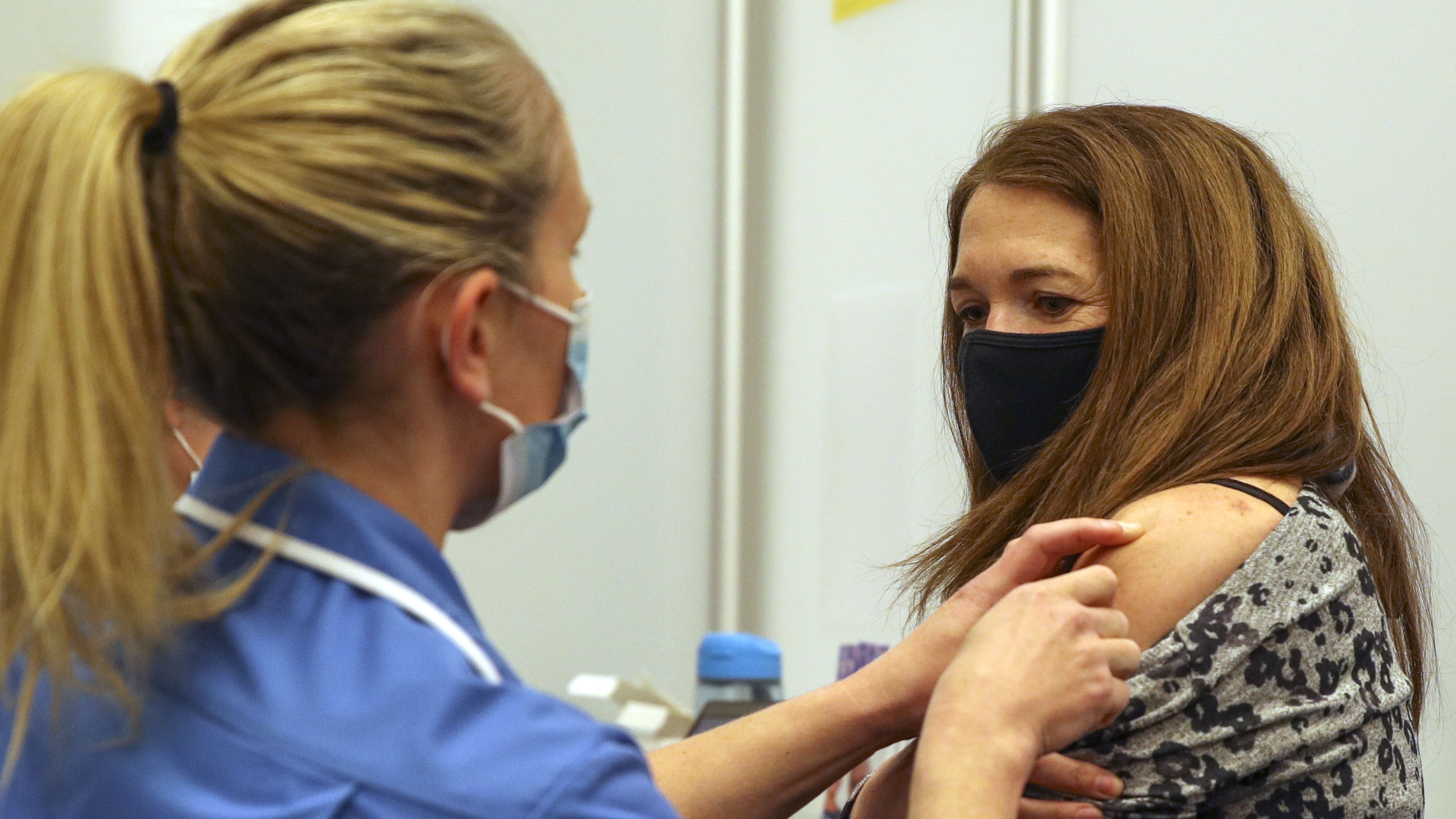What do we know about mixing vaccines?
Major mix-and-match study expanded to include Moderna and Novavax

A free daily email with the biggest news stories of the day – and the best features from TheWeek.com
You are now subscribed
Your newsletter sign-up was successful
A major UK trial exploring the possibility of a mix-and-match approach to Covid vaccination is being expanded to include the Moderna and Novavax jabs.
Scientists behind the Com-COV study, led by the University of Oxford, hope that combining vaccines could give “broader, longer-lasting immunity” against the coronavirus and new variants, reports the BBC. Using different brands of vaccination for first and second doses would also give more flexibility to the vaccine rollout.
The study is looking for volunteers over 50 who have had a first dose of Pfizer or AstraZeneca.
The Week
Escape your echo chamber. Get the facts behind the news, plus analysis from multiple perspectives.

Sign up for The Week's Free Newsletters
From our morning news briefing to a weekly Good News Newsletter, get the best of The Week delivered directly to your inbox.
From our morning news briefing to a weekly Good News Newsletter, get the best of The Week delivered directly to your inbox.
More than 800 people have already participated in the trial, but Professor Matthew Snape, from the Oxford Vaccine Group, is hoping to recruit a further 1,050 volunteers who have received one vaccine dose on the NHS in the past eight to 12 weeks.
Volunteers will receive a second dose, which could be the same as the first, or a shot of the Moderna or Novavax vaccine.
Researchers are looking for adverse reactions or immune system responses to new combinations of vaccine, rather than looking at whether the vaccines are effective at preventing disease. The study is designed to show that “mixing is not substantially worse than not mixing”, explains Sky News.
Most health experts agree that mixing and matching vaccines should be safe; the trial will try to determine if there are any possible combinations that should be avoided. Professor Snape told the BBC he hoped the trial “won’t rule out any possible combinations”.
A free daily email with the biggest news stories of the day – and the best features from TheWeek.com
“That’s how we need to look at it: Are there any combinations we shouldn’t be giving, because they don’t generate a good immune response?”
Danny Altmann, a professor of Immunology at Imperial College, who is not involved in the trials, told CNBC last week that he couldn't see “any argument why” mixing vaccines would be “unsafe or poor practice”.
“It would still induce great immunity. No problem with that whatsoever,” he said.
Andrew Freedman, a reader in infectious diseases at Cardiff University’s School of Medicine, also told the news organisation there was “no theoretical reason why that shouldn’t be feasible and safe, but we have to wait for these studies.”
Studies into the possibility of mixing different types of vaccine have become of particular interest after both Europe and the UK’s health regulatory agencies found a possible link between the Oxford-AstraZeneca vaccine and rare cases of blood clots, with young adults at a slightly increased risk.
The UK’s Joint Committee on Vaccination and Immunisation (JCVI) has emphasised that the benefits of the protection that the AstraZeneca vaccine offers against Covid “far outweigh” the risks of an adverse reaction in the vast majority of people. But the committee is advising that adults under 30 without underlying health conditions should be offered an alternative vaccine “if available”.
France’s health regulator recommends that people under the age of 55 who have received their first dose of AstraZeneca should have Pfizer or Moderna for their second dose, with Germany similarly advising that people under the age of 60 should opt for a different vaccine for their second dose.
The Centre for Disease Control in China says it is also considering mixing vaccines in order to boost efficacy, reports the BBC, with suggestions that some vaccines approved for public use in the country have efficacy as low as 50%. By contrast, the AstraZeneca vaccine is claimed to have 100% efficacy against severe or critical disease, and 76% efficacy against symptomatic Covid.
Russia’s Sputnik V vaccine involves using two slightly different doses to give immunity.
While some results from the first stage of the Com-COV study are expected next month, the trial will have reportable findings by the summer.
Professor Snape said mixing vaccines “will give us lots of flexibility, not just in the UK, not just in Europe – where we’re looking at restricting use of some vaccines for some age groups – but across the world, where we have, perhaps, a little bit more intermittent supply of vaccines.”
“Let’s hope that we can actually use this to get two doses of vaccine to as many people as possible.”
Sorcha Bradley is a writer at The Week and a regular on “The Week Unwrapped” podcast. She worked at The Week magazine for a year and a half before taking up her current role with the digital team, where she mostly covers UK current affairs and politics. Before joining The Week, Sorcha worked at slow-news start-up Tortoise Media. She has also written for Sky News, The Sunday Times, the London Evening Standard and Grazia magazine, among other publications. She has a master’s in newspaper journalism from City, University of London, where she specialised in political journalism.
-
 What to know before filing your own taxes for the first time
What to know before filing your own taxes for the first timethe explainer Tackle this financial milestone with confidence
-
 The biggest box office flops of the 21st century
The biggest box office flops of the 21st centuryin depth Unnecessary remakes and turgid, expensive CGI-fests highlight this list of these most notorious box-office losers
-
 The 10 most infamous abductions in modern history
The 10 most infamous abductions in modern historyin depth The taking of Savannah Guthrie’s mother, Nancy, is the latest in a long string of high-profile kidnappings
-
 A Nipah virus outbreak in India has brought back Covid-era surveillance
A Nipah virus outbreak in India has brought back Covid-era surveillanceUnder the radar The disease can spread through animals and humans
-
 Is the US about to lose its measles elimination status?
Is the US about to lose its measles elimination status?Today's Big Question Cases are skyrocketing
-
 Covid-19 mRNA vaccines could help fight cancer
Covid-19 mRNA vaccines could help fight cancerUnder the radar They boost the immune system
-
 Is this the end of ultraprocessed foods?
Is this the end of ultraprocessed foods?Today's Big Question California law and the MAHA movement are on the same track
-
 Can TrumpRx really lower drug prices?
Can TrumpRx really lower drug prices?Today’s Big Question Pfizer’s deal with Trump sent drugmaker stocks higher
-
 The new Stratus Covid strain – and why it’s on the rise
The new Stratus Covid strain – and why it’s on the riseThe Explainer ‘No evidence’ new variant is more dangerous or that vaccines won’t work against it, say UK health experts
-
 RFK Jr. vaccine panel advises restricting MMRV shot
RFK Jr. vaccine panel advises restricting MMRV shotSpeed Read The committee voted to restrict access to a childhood vaccine against chickenpox
-
 RFK Jr. scraps Covid shots for pregnant women, kids
RFK Jr. scraps Covid shots for pregnant women, kidsSpeed Read The Health Secretary announced a policy change without informing CDC officials